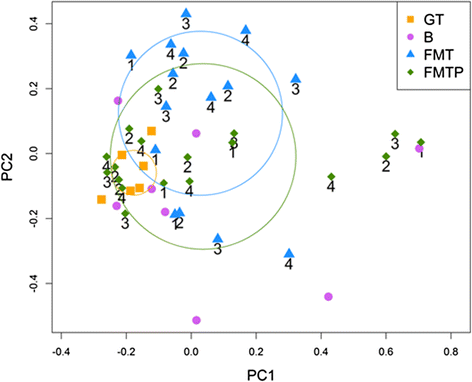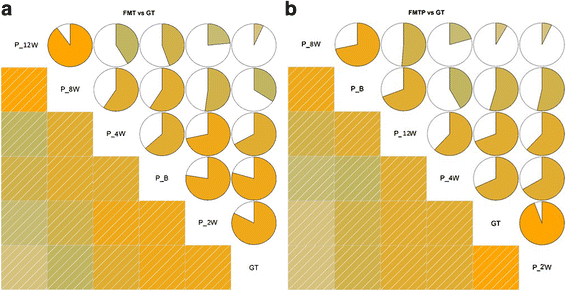Pectin enhances the effect of fecal microbiota transplantation in ulcerative colitis by delaying the loss of diversity of gut flora
- PMID: 27809778
- PMCID: PMC5095982
- DOI: 10.1186/s12866-016-0869-2
Pectin enhances the effect of fecal microbiota transplantation in ulcerative colitis by delaying the loss of diversity of gut flora
Abstract
Background: Fecal microbiota transplantation (FMT) induces remission in ulcerative colitis (UC). However, the treatment effect of FMT diminishes over time. Maintaining the diversity of the gut flora for long periods may improve the effects of FMT in UC. Pectin, which can be fermented by gut microbiota into short-chain fatty acids, is postulated to shape the composition and maintain the balance of gut microbiota following transplantation. This study investigated whether pectin could enhance the effects of FMT in UC patients.
Results: Three FMT patients and four FMTP patients achieved the primary outcome. The Mayo scores of the FMTP group were lower than those of the FMT group at weeks 4 and 12 (P = 0.042 and P = 0.042, respectively). There were no differences in the diversity of the gut flora between the two groups at weeks 4 and 12; however, the composition of the gut flora of the FMTP group was more similar than the FMT group to that of the donor at all-time points post-treatment.
Conclusions: Pectin decreased the Mayo score by preserving the diversity of the gut flora following FMT for UC.
Trial registration: Current Controlled Trial NCT02016469 . Registered 10 November 2013.
Keywords: Diversity; Fecal microbiota transplantation; Mayo score; Pectin; Ulcerative colitis.
Figures




References
-
- Kump PK, Gröchenig HP, Lackner S, Trajanoski S, Reicht G, Hoffmann KM, et al. Alteration of intestinal dysbiosis by fecal microbiota transplantation does not induce remission in patients with chronic active ulcerative colitis. Inflamm Bowel Dis. 2013;19(10):2155–10. doi: 10.1097/MIB.0b013e31829ea325. - DOI - PubMed
Publication types
MeSH terms
Substances
Associated data
LinkOut - more resources
Full Text Sources
Other Literature Sources
Medical

